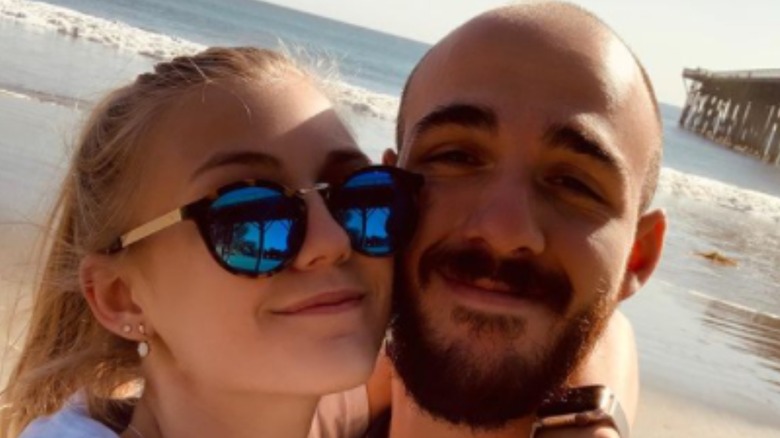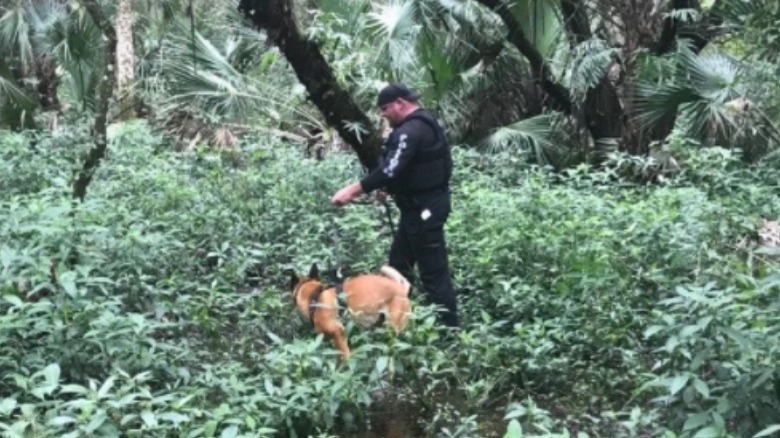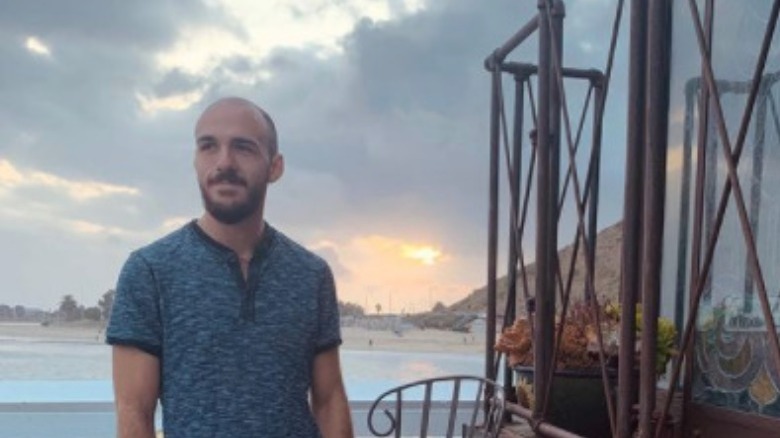Brian Laundrie's Cause Of Death Explained
By the time Brian Laundrie was found on October 21 after being reported missing five weeks earlier, his corpse had been submerged underwater in South Florida for long enough to turn the 23-year-old "person of interest's" remains skeletal. Laundrie was the last person to see his 22-year-old finacé, Gabby Petito, alive when the couple was on a months-long road trip. Two months after Petito and Laundrie set off on the open road, he showed up at his parents' house in Florida on September 1, alone. Petito wasn't reported missing until September 11 when her family couldn't get answers from the Laundries, nor could they reach Petito.
The sketchy situation became a national newsmaker. While Petito was still missing, Laundrie's parents — who consistently refused to talk to police about what Brian told them about Petito — reported him missing on September 13. Chris and Roberta Laundrie told North Port Police that their son, Brian, was going to a favorite place of his called the Carlton Reserve in Sarasota County, a nearly 25,000 acre nature reserve replete with 80 miles of hiking trails, according to Visit Sarasota. Various law enforcement agencies along with interested internet sleuths all set out to solve the case.
On September 19, Gabby Petito's remains were found in Grand Teton National Park. A medical examiner ruled her cause of death a homicide by strangulation. The search for Brian Laundrie continued.
Brian Laundrie's partial remains were finally found
When investigators found Laundrie's remains, it illuminated why he'd been so hard to find. Laundrie's body, a notebook, and his backpack were all found near each other at about a 45-minute walk into the park, CNN reported. The swampy area had been submerged under water due to lots of rain, but as the weather dried out, so did the area where Laundrie died, uncovering his partial remains.
According to what North Port Police Department wrote on their Facebook page, the search was hampered by the landscape. They wrote, "Please be aware, the Carlton Reserve is a vast and unforgiving location at times. It is currently waist deep in water in many areas. This is dangerous work for the search crews as they are wading through gator and snake infested swamps and flooded hiking and biking trails."
According to Laundrie's Instagram page, which is now taken down, he was an avid hiker and a "nature enthusiast." He also wrote in his bio, "bug bites are better than being brainwashed by the media," which is ironic in light of what cattle rancher, Alan McEwen, who lives close to the reserve told CNN.
"The mosquitoes will carry you off, anybody out there more than a day without mosquito spray, you'd go insane with the bugs getting you and everything else," McEwen said. So far though, it's unclear how long Laundrie was in the preserve before he died. His initial autopsy came back inconclusive.
A forensic anthropologist ruled the cause of death a suicide
Due to all of the natural factors of the reserve and their effect on a dead body, some of the clues as to what caused Laundrie's death were gone, leaving only theories about what happened, for the short term at least. After the medical examiner's autopsy results came back inconclusive, the remains were sent to a forensic anthropologist. According to the Museum of Natural History, forensic anthropologists specialize in analyzing skeletal remains and bones to find out how a person died, who they may have been, and how long they were dead before being discovered. In Laundrie's case, his teeth were still in tact enough to make a positive identification, per TMZ.
On November 23, more than two months after Petito's remains were found, the forensic anthropologist released their findings. According to what the Laundrie family attorney, Steve Bertolino, told TMZ, Brian Laundrie committed suicide by shooting himself in the head. Bertolino said he "hope[s] these findings bring closure to both families."
If you or someone you know is dealing with domestic abuse, you can call the National Domestic Violence Hotline at 1−800−799−7233. You can also find more information, resources, and support at their website.
If you or anyone you know is having suicidal thoughts, please call the National Suicide Prevention Lifeline at 1-800-273-TALK (8255).


